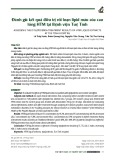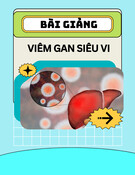
Hepatitis B Infections
Hepatitis B is considered a "silent infection" because most people don't have
symptoms when they are first infected. When a person is first infected with
hepatitis B, their bodies can react in different ways:
Some people who are infected may have mild symptoms (fever or
fatigue) that are mistaken for the flu or a bad cold.
Others may go to a doctor because they feel more tired than usual,
don't feel like eating, have an upset stomach, or complain about joint pain.
Less common but more serious symptoms include severe nausea and
vomiting, yellow eyes and skin (this is called "jaundice"), and a swollen
stomach - these symptoms require immediate medical attention and a person
may need to be hospitalized.
It is always a good idea to talk to your doctor if you don't feel well or if you
are uncertain about whether you may have been infected with hepatitis B.
Most people do not know that they have been infected with hepatitis B. A
simple blood test can easily diagnose a hepatitis B infection.

What blood test should I ask my doctor to order?
Make sure that your doctor orders hepatitis B blood tests. There are 3
common tests that make up the hepatitis B blood test panel. This is a very
simple blood test that can be done in the doctor's office. If you think you
have been recently infected with hepatitis B, it will take 4-6 weeks before a
blood test will be positive for the virus.
Make sure your doctor clearly explains your blood test results so that you
know whether you have hepatitis B or not. You want to know whether you
have recovered from a hepatitis B infection or whether you have become
chronically infected. Your doctor may check your blood again in 6 months
to confirm your diagnosis. Always ask for a written copy of your blood tests.
For more information about the hepatitis B blood tests, visit our Blood Tests
page.
Where can I go to be tested and vaccinated?
You can ask your family doctor, the local health department, or community
health clinic to order the simple hepatitis B blood test. You can also start the
hepatitis B vaccine series.
If you need help finding a doctor or want more information, please call the
Hepatitis B Information and Assistance HelpLine at 1-888-888-0981. This is
a free telephone call, which is part of a national community program

sponsored by GlaxoSmithKline. All information is available in Vietnamese,
English, Mandarin, Cantonese, Korean.
If you speak English, please contact the Hepatitis B Foundation by email at
info@hepb.org or call us at 215-489-4900.
What will happen if I am infected with hepatitis B?
When an adult is first infected with the hepatitis B virus (HBV), their body
usually responds in three different ways:
Recovery - 90% of healthy adults who are infected will recover and
get rid of the virus within six months. When a blood test shows that the
hepatitis B virus has gone and that "surface antibodies" have been made, a
person is then considered to have recovered. They are no longer contagious
to others. The "surface antibodies" protect them from any future hepatitis B
infections. These people do not need the vaccine since they are already
protected.
Chronic Infections - 10% of infected adults are unable to get rid of
the virus after six months. They are diagnosed as being "chronic carriers" of
hepatitis B. This means that the virus can stay in their blood and liver for
possibly a lifetime. People who are "chronic carriers" of HBV are able to
pass the virus on to others and are at higher risk for developing cirrhosis or
liver cancer later in life.

Acute Liver Failure - Less than 1% of infected adults can have a
severe reaction and die from liver failure within several weeks after being
exposed to the hepatitis B virus. Liver failure is life-threatening and a person
must receive immediate medical care. This is a very rare reaction.
What do all these numbers really mean?
Imagine you are sitting in a room. There are 100 people in this room,
including yourself. The door opens and the hepatitis B virus walks in and
infects everyone. You all go home. Some people may feel sick in a couple of
weeks, most of you will not. Six months later, everyone is asked to return to
the room for a hepatitis B blood test. All 100 people who were infected six
months ago will fall into one of the following groups:
90 people will receive the good news that they have recovered and
gotten rid of the virus; they can go home.
9 or 10 people (maybe including yourself?) will be diagnosed as being
"chronic HBV carriers" because they have been unable to get rid of the virus
after six months. They are told to make simple lifestyle changes to protect
their liver, to test and vaccinate their loved ones, and to find a doctor who
can provide good medical care.
Although rare, 1 person may have a severe reaction to the hepatitis B
virus and die from their infection.

What happens when babies and children are infected with hepatitis B?
Babies and children are at the highest risk for developing chronic hepatitis B
infections once they are exposed to the virus. Although most chronically
infected children do not suffer any symptoms, the virus can stay in their
blood and liver for a lifetime, which increases their risk for liver cancer later
in life.
Babies - 90% of all babies born to infected women will become
chronic carriers. They only have a 5-10% chance of getting rid of the virus.
Children - 60% of young children who are exposed to HBV through
contact with other infected children or adults will become chronic carriers.
They have a 40% chance of getting rid of the virus.
How will I know if I have "recovered" from a hepatitis B infection?
Ask your doctor for the simple hepatitis B blood tests to find out whether
you have recovered from hepatitis B. The blood tests will show that your
immune system has gotten rid of the virus and produced "hepatitis B surface
antibodies" (HbsAb+ or anti-HBs+). These "surface antibodies" will protect
you for a lifetime from any future contact with the hepatitis B virus. It can
take up to six months to get rid of the virus entirely, so be patient and careful
since you may still be able to spread the virus to others. However, once your





![Bài giảng Thuốc hóa đàm, chỉ ho, bình suyễn - PGS.TS Bùi Hồng Cường [Chuẩn Nhất]](https://cdn.tailieu.vn/images/document/thumbnail/2025/20250424/laphongkim0906/135x160/9251745495275.jpg)



![Đánh giá tác dụng tăng lực của viên nang Linh Lộc Sơn trên thực nghiệm: [Phân tích chi tiết]](https://cdn.tailieu.vn/images/document/thumbnail/2025/20250228/viinuzuka/135x160/7461740737076.jpg)
















